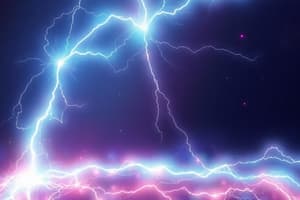Podcast
Questions and Answers
What is the unit of measurement for electrical current?
What is the unit of measurement for electrical current?
- Amperes (correct)
- Volts
- Watts
- Coulombs
According to Ohm's Law, what is the relationship between voltage, current, and resistance?
According to Ohm's Law, what is the relationship between voltage, current, and resistance?
- Voltage = Current - Resistance
- Voltage = Current / Resistance
- Voltage = Current + Resistance
- Voltage = Current * Resistance (correct)
What is a common focus for researchers investigating solid state devices in the context of current electricity?
What is a common focus for researchers investigating solid state devices in the context of current electricity?
- Exploring the properties of magnetic fields
- Developing faster computers and more powerful microprocessors (correct)
- Understanding the behavior of light particles
- Researching ocean currents
How do light bulbs utilize electrical energy to produce light?
How do light bulbs utilize electrical energy to produce light?
What do high school and college curricula often introduce to students interested in current electricity?
What do high school and college curricula often introduce to students interested in current electricity?
In the context of current electricity, what do transistors primarily do?
In the context of current electricity, what do transistors primarily do?
What skills are often fostered among aspiring scientists exploring basic circuit components in high school and college?
What skills are often fostered among aspiring scientists exploring basic circuit components in high school and college?
How do batteries provide current to portable electronics?
How do batteries provide current to portable electronics?
What do physics majors often delve into at universities in relation to current electricity?
What do physics majors often delve into at universities in relation to current electricity?
How do programs focused on current electricity at universities prepare students?
How do programs focused on current electricity at universities prepare students?
Flashcards are hidden until you start studying
Study Notes
Unlocking the Secrets Through Current Electricity in Physics
Current electricity lies at the core of our understanding of physical phenomena. From illuminating homes to powering supercomputers, electrical current drives technological innovations. Let's dive deeper into the realm of current electricity by exploring its principles and real-world applications.
Foundational Principles
Electrical current is the flow of charge through an electric circuit due to an electromotive force (EMF), such as a battery or generator. Current is measured in amperes (A): (1\text{ A} = 1,\text{coulomb}/\text{second}). Ohm's Law relates voltage and resistance with current: (\text{Voltage} = \text{Current} \times \text{Resistance}). Kirchhoff's laws govern the behavior of electrical circuits, ensuring conservation of energy and charge.
Real-World Applications
Current electricity powers countless devices worldwide. Light bulbs convert electrical energy into light by heating filaments; transistors amplify signals in electronic devices, allowing us to enjoy entertainment systems. Batteries store chemical energy and release it via electrochemical reactions to supply portable electronics with current.
Research in current electricity spans various domains and scales. Scientists pursue advances in materials science, developing better conductive metals and polymers to improve efficiency and performance in solar cells, batteries, and other technologies. Other researchers investigate microscopic processes occurring in solid state devices, enabling the development of faster computers and more powerful microprocessors.
Educational Opportunities
Students interested in current electricity often engage in hands-on learning opportunities. High school and college curricula introduce fundamental concepts and practical techniques using basic circuit components, such as resistors, capacitors, and batteries. Exploring these building blocks fosters critical thinking, problem-solving, and creativity among aspiring scientists.
At universities, physics majors immerse themselves in advanced topics, delving into theoretical models explaining the behavior of charged particles, studying complex electronic devices, and analyzing cutting-edge research breakthroughs. These programs equip students with essential knowledge and methods, preparing them for rewarding careers in industry, academia, or government agencies.
By unlocking the secrets behind current electricity, we continue to advance society's technological capabilities and improve lives globally, propelling humanity towards a brighter tomorrow.
Studying That Suits You
Use AI to generate personalized quizzes and flashcards to suit your learning preferences.




